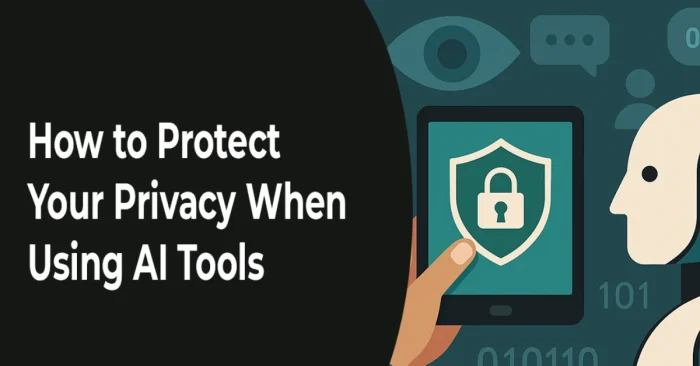Overview
AI tools for online privacy help individuals and businesses protect their digital identity, data, and communications from unauthorized access. These tools use artificial intelligence to detect suspicious activity, block trackers, and encrypt sensitive information in real time. Unlike traditional privacy methods, AI adapts continuously, learning from threats and user behavior to strengthen protection. From monitoring data leaks to preventing phishing and identity theft, AI ensures a safer online experience. Both small users and large organizations benefit from AI-driven privacy tools, as they balance strong security, ease of use, and adaptability in today’s fast-changing digital environment.
1. AI in Data Anonymization
AI helps anonymize user data by masking personal information and removing identifiable markers. This ensures online activities cannot be easily traced back to individuals. Businesses use AI anonymization to comply with data protection laws, while individuals enjoy safer browsing. Adaptive algorithms adjust to new risks, protecting privacy without reducing digital functionality or convenience for users.
2. AI for Tracking Protection
AI tools block tracking scripts, cookies, and hidden analytics that collect user information online. Unlike static blockers, AI identifies new tracking methods and stops them instantly. This protects browsing habits from advertisers, hackers, and surveillance systems. Users maintain stronger control over their data, ensuring websites cannot exploit personal information for profiling or targeted manipulation purposes.
3. AI in Secure Communication
AI enhances secure messaging and email platforms by providing encryption and real-time threat detection. It analyzes patterns to identify phishing or malicious attachments. These tools also ensure encrypted end-to-end communication remains uncompromised. Individuals and businesses benefit from safe exchanges of sensitive data, making AI-driven communication systems essential for privacy in professional and personal contexts online.
4. AI for Identity Protection
AI tools monitor the web and dark web for leaked credentials or stolen identities. They alert users if personal data appears in breaches, allowing quick action. Unlike manual checks, AI scans continuously and adapts to evolving cybercriminal tactics. Identity protection ensures users remain in control, reducing the risk of fraud, impersonation, or financial exploitation effectively.
5. AI in Behavioral Analysis
AI studies user behavior, such as login habits and device usage, to detect anomalies. If unusual activity appears, like login attempts from different countries, AI enforces stronger security. This prevents unauthorized access and ensures accounts remain private. Behavioral analysis gives continuous, adaptive protection, offering both individuals and organizations reliable privacy without constant manual monitoring.
6. AI for Anti-Phishing
AI detects phishing websites and fake login portals by analyzing patterns in design, links, and language. It warns users before entering credentials on suspicious sites. Businesses also use AI filters to protect employees from scam emails. This proactive defense ensures data remains private, helping users avoid common traps that lead to information theft and fraud.
7. AI in Cloud Privacy Protection
AI secures cloud data by monitoring access, encrypting files, and detecting unusual activities. Businesses rely on AI to ensure sensitive files are protected from hackers and insider threats. For individuals, AI-driven cloud privacy tools keep personal documents safe. This real-time monitoring provides both security and peace of mind, strengthening overall online privacy effectively across platforms.
8. AI for Location Privacy
AI tools hide or randomize user location to prevent tracking by apps and websites. Unlike traditional VPNs, AI adapts dynamically, making it harder for third parties to pinpoint exact locations. This protects users from targeted ads, surveillance, and stalking. Location privacy ensures individuals maintain control over their digital footprint, boosting safety in online interactions significantly.
9. AI in Privacy Compliance
AI helps organizations comply with privacy regulations like GDPR or CCPA. It monitors data usage, flags risks, and automates compliance reporting. Businesses reduce penalties and maintain customer trust by ensuring data is handled legally. For individuals, compliance-focused AI tools give assurance that their personal information is not misused, creating a more transparent digital environment globally.
10. AI for Predictive Privacy Protection
AI uses predictive analytics to forecast privacy risks before they occur. By studying emerging cyber threats, browsing patterns, and new attack methods, AI tools suggest preventive actions. This proactive approach reduces vulnerabilities, helping both individuals and organizations stay ahead of hackers. Predictive privacy ensures users remain protected against tomorrow’s threats, not just today’s challenges online.
(FAQs)
Q1: Can AI completely protect online privacy?
No, but AI significantly reduces risks by adapting to new threats and providing real-time protection for data and identity.
Q2: Are AI privacy tools suitable for personal use?
Yes, individuals can use them for safe browsing, identity protection, and secure communication effectively.
Q3: Do businesses benefit from AI-driven privacy tools?
Yes, businesses gain compliance, stronger customer trust, and better defense against data breaches and insider threats.
Learn More About AI Course https://buhave.com/courses/learn/ai/






